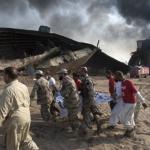No Work, No Safety, No Justice – The Aftermath of Pakistan’s Shipbreaking Disaster

Just over one month after the deadliest accident in shipbreaking history devastated the Gadani shipbreaking yard in Pakistan, the sprawling facility has reopened with no tangible improvement to health and safety provisions and nothing in the way of compensation for affected workers and their families.
On 1 November, a floating oil production tanker, ACES (IMO #8021830), caught fire killing at least 28 workers, leaving scores missing and more than 50 people injured.
According to Shipbreaking Platform, a coalition of environmental, human rights and labour rights organisations working towards safe and clean ship recycling, “the blast was so strong that parts of the ship were blown up to two kilometres away and the fire took more than three days to extinguish”.
The tanker had recently changed from an Indonesian flag to a Djiboutian flag before its arrival in Gadani; this is common practise in an industry where unscrupulous ship owners go to great lengths to avoid liability for the prevalence of unsafe and environmentally-unfriendly shipbreaking practices.
Shipbreaking is one of the most dangerous jobs in the world. Workers and labour rights activists had been pressing for the drastic improvement in safety measures at Gadani – the world’s third largest shipbreaking yard after Chittagong in Bangladesh and Alang in India – long before last month’s accident, but to no avail.
In May 2016, for example, striking shipbreakers called on the government of Pakistan to enforce the Hong Kong International Convention for the Safe and Environmentally Sound Recycling of Ships and the Basel Convention on the Control of Transboundary Movements of Hazardous Wastes.
Nasir Mansour, secretary general of the National Trade Union Federation (NTUF) told Equal Times: “And just two days before this tragic accident we held a protest demonstration in Karachi against the appalling state of affairs at Gadani.”
‘’On a daily basis, at least two labourers are sustaining serious injuries and 28 labourers are losing their lives every year due to the hazardous working environment and dearth of rescue or safety means,” he said.
Poor pay, dangerous work, no protection
Some 6,000 labourers work at Gadani in dangerous conditions with no contracts, no job security, few health and safety provisions, and for wages of between 450 (US$4.30) and 1450 (US13.80) rupees per day.
Situated about 50 kilometres from Pakistan’s commercial capital of Karachi, Gadani contains 132 shipbreaking units along 10 kilometres of beachfront and is thought to salvage more than a million tonnes of steel every year, most of which is sold domestically.
Workers dismantle ships with scant safety equipment in poorly ventilated areas where they are exposed to harmful substances.
Accidents and burns are commonplace but with no access to clean water, decent sanitation or medical facilities, injured workers have to travel to Karachi to go to a clinic or hospital, and usually at their own cost. When Gadani reopened last week, none of this had changed.
On the first Sunday after the accident, some 10,000 people gathered in Gadani in solidarity with the victims and to protest the government’s failure to guarantee adequate compensation for affected workers and their families.
As of the first week of December, workers had still not received any compensation.
The NTUF is calling for three million rupees (approximately US$28,600) for each worker who died and 500,000 rupees (approximately US$4760) for each injured worker, but the government is yet to confirm how much will be paid out.
Boost for the local steel industry
Just a few days after the deadly accident, Pakistan’s Prime Minister Nawaz Sharif attended a lavish inauguration ceremony marking the acceleration of global trade with China via Pakistan’s brand-new Gwadar port.
Sharif’s entire speech was focused on glorifying the multi-billion-dollar China-Pakistan Economic Corridor (CPEC) that aims to link China’s north-western Xinjiang region with Gwadar via a number of highways and rail links.
On the Gadani tragedy, Sharif – whose family owns the Ittefaq steel giant – limited his words and actions to the formation of a high-level committee to investigate the cause of the fire and the possibility of criminal liability.
Observers say that the temporarily closure of Gadani only served to stimulate the demand for locally produced steel, benefitting industrialists like Sharif, while producing no tangible safety improvements.
Meanwhile, the thousands of informal workers who depend on Gadani for their livelihoods were adversely affected by the shutdown. Bashir Mehmoodani, president of Pakistan’s Ship Breaking Workers Union, told Equal Times. “Many labourers have already moved out in search for other manual jobs in different parts of the country.”
Workers at Gadani say that many shipbreaking operators import tankers containing fuel, which is then sold on the black market to compensate for the high duties and taxes imposed on the industry.
The intensity of the 1 November blast and the quality of smoke afterwards suggests that there was a quantity of fuel in the tanker, but workers say that they were unaware.
“Workers in this industry are exploited everywhere [in Pakistan],” said Mansour. “The laws for minimum wages, social security and fixed workings hours are not respected at Gwadar. In Gadani, the life of labourers is under direct threat, with literally no safety or ground rules in place.’’
But until the government of Pakistan shows the political will to institute radical reforms to protect the lives and improve the wages of vulnerable, underpaid shipbreaking workers, so it shall continue.
Shadi Khan Saif is a multimedia journalist based in Karachi, Pakistan. He currently freelances for Deutsche Welle and Asia Calling TV.
